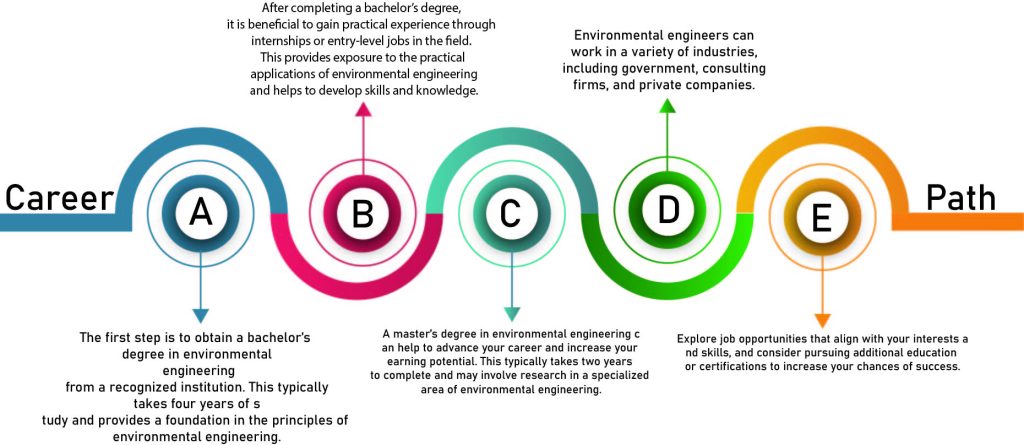Environmental engineering is a branch of engineering that involves the application of science and engineering principles to improve the natural environment and to provide solutions for environmental problems. This includes designing systems and processes for water and air pollution control, waste management, sustainable energy production, and environmental remediation. Environmental engineers also work to minimize the impact of human activities on the environment and promote sustainability.

Work description
The work of an environmental engineer typically involves designing, developing, and implementing solutions to environmental problems.
This may include conducting environmental assessments, developing plans for pollution control, designing and testing equipment and systems for water and air treatment, managing waste disposal and recycling programs, and ensuring compliance with environmental regulations.
Environmental engineers may work in a variety of industries, including government, consulting firms, and private companies.
They may also collaborate with other professionals, such as scientists, policy makers, and community stakeholders, to address environmental issues and promote sustainability.
High Demand
The opportunity to make a positive impact on the environment and contribute to sustainability efforts.
Lucrative salaries
A growing demand for environmental engineers due to increasing environmental concerns and regulations.
Opportunities for innovation
The ability to work in a variety of industries, including government, consulting firms, and private companies.
Versatility
A challenging and intellectually stimulating career that requires problem-solving and critical thinking skills.
Flexibility
The potential for career growth and advancement in the field, as well as competitive salaries and benefits.
Job satisfaction
The opportunity to work on innovative and cutting-edge technologies and projects.
High stress
The job can be physically demanding and may involve working in challenging environments, such as remote locations or hazardous conditions.
Long hours
The work may be emotionally taxing, as environmental engineers may be faced with the difficult task of balancing economic interests with environmental protection.
Competitive field
Environmental engineering projects can be complex and may require significant time and resources to complete.
Constant learning
The field can be highly competitive, with a limited number of job opportunities in some areas.
Isolation
Environmental engineers may be required to stay up-to-date with constantly changing regulations and technological advancements.
Eye strain and other physical health issues
The work may require extensive travel, particularly for consulting or government positions.
The cost of pursuing a career in environmental engineering in India can vary depending on various factors such as the institution, location, and the type of program. Here are some estimated costs:
Bachelor’s degree in environmental engineering: The cost can range from INR 50,000 to INR 2 lakhs per year, depending on the institution and location.
Master’s degree in environmental engineering: The cost can range from INR 1 lakh to INR 5 lakhs per year, depending on the institution and location.
PhD in environmental engineering: The cost can range from INR 10,000 to INR 1 lakh per year, depending on the institution and location.
In addition to tuition fees, there may be other expenses such as accommodation, transportation, books, and equipment that need to be factored in.
[wpcharts type=”horizontalbarchart” bgcolor=”red:gray:yellow,blue:gray:yellow,random:gray:yellow,purple:gray:yellow” min=”0″ legend=”true” titles=”2 year , 5 year” values=”3,7,5,12″]
The earning potential of an environmental engineer in India can vary depending on factors such as experience, location, industry, and job role. Here are some estimated salaries:
Entry-level environmental engineer: INR 3 lakhs to INR 6 lakhs per annum
Mid-career environmental engineer: INR 6 lakhs to INR 12 lakhs per annum
Senior-level environmental engineer: INR 12 lakhs to INR 20 lakhs per annum
The above figures are only estimates and may vary depending on the company, industry, and location.
Salaries may also vary based on the type of organization an environmental engineer works for, such as government agencies, consulting firms, or private companies.
Furthermore, additional education or certifications can help increase earning potential.
[wpcharts type=”horizontalbarchart” bgcolor=”red:gray:yellow,blue:gray:yellow,random:gray:yellow,purple:gray:yellow” min=”0″ legend=”false” titles=”Entry-Level, Mid-Career, Senior-Level ” values=”5,15,25,35,45,55″]
Strong foundation in mathematics and science.
Critical thinking and problem-solving skills.
Interest in environmental issues and sustainability.
Strong written and oral communication skills.
Ability to work in a team and collaborate with other professionals.
Attention to detail and ability to analyze data.
Flexibility and adaptability to changing regulations and technologies.
Poor time management skills.
Lack of interest in environmental issues and sustainability.
Inability to work in a team or collaborate with others.
Weak written or oral communication skills.
Difficulty with mathematics or science.
Inability to adapt to changing regulations or technologies.
Lack of attention to detail or inability to analyze data.
Work-life balance
The work-life balance of an environmental engineer can vary depending on the company, industry, and specific job role. However, in general, environmental engineers can have a good work-life balance compared to other engineering professions.
Many environmental engineering jobs offer flexible work schedules and the ability to work remotely, which can provide a better work-life balance.
Unlike other engineering professions that may require working long hours or being on call, environmental engineers generally have predictable schedules with standard work hours.
Environmental engineering jobs often focus on health and safety, which can help to create a positive and supportive work environment.
Environmental engineers may work for companies or organizations that prioritize sustainability, which can align with personal values and contribute to job satisfaction.

Environmental engineers work to protect public health by improving air and water quality, reducing exposure to hazardous waste, and managing environmental risks.
Environmental engineering promotes sustainable practices and the responsible use of resources, which can benefit both current and future generations.
Environmental engineering can help to mitigate the impact of climate change by reducing greenhouse gas emissions, promoting renewable energy, and developing sustainable infrastructure.
Environmental engineers work to ensure compliance with environmental regulations and laws, which helps to protect public health and the environment.
Environmental engineers may work to advance environmental justice by ensuring that all communities have access to clean air and water, and by addressing environmental inequalities.
Environmental engineering can support economic development by creating jobs in areas such as renewable energy, waste management, and sustainable infrastructure.
Water and Wastewater Engineering
Focuses on designing and managing systems for the treatment and distribution of drinking water, as well as the collection and treatment of wastewater.
Air Pollution Control Engineering
Focuses on developing and implementing strategies to reduce air pollution from various sources, such as transportation, industry, and energy production.
Solid and Hazardous Waste Management
Focuses on managing and minimizing the environmental impact of solid and hazardous waste through techniques such as recycling, composting, and landfill management.
Environmental Remediation
Focuses on cleaning up contaminated sites and restoring them to their natural state, often through the use of techniques such as soil and groundwater remediation.
Renewable Energy Engineering
Focuses on developing and implementing sustainable energy systems, such as wind and solar power, that reduce reliance on fossil fuels and mitigate the impact of climate change.
Conclusion:
In conclusion, environmental engineering offers a rewarding career path for those interested in making a positive impact on the environment and public health. With a variety of specializations and opportunities for growth, environmental engineering provides a unique combination of technical skills and social responsibility, making it a fulfilling and meaningful career choice.



